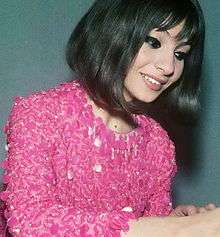Esther Ofarim
| Esther Ofarim | |
|---|---|
|
Esther Ofarim, 1966 | |
| Background information | |
| Native name | אסתר עופרים |
| Birth name | Esther Ofarim |
| Born |
June 13, 1941 Safed, British Palestine |
| Genres | Folk, pop, Jewish Yemenite |
| Occupation(s) | Singer, songwriter, musician |
| Years active | 1959–present |
| Labels | Hed Arzi, Israphon, Philips, EMI |
| Associated acts | Abi Ofarim |
| Website |
www |
Esther Zaied, better known by her married name Esther Ofarim (Hebrew: אסתר עופרים; born June 13, 1941), is an Israeli international singer. She came second in the Eurovision Song Contest 1963 with the song "T'en vas pas", representing Switzerland. After marrying Abi Ofarim (born Abraham Reichstadt) and for a full decade in the 1960s, she was half of the singing husband and wife duo, Esther & Abi Ofarim. After they divorced, the duo broke up and she undertook a successful solo career.
Beginnings
Esther Zaied was born in Safed to a Syrian Jewish family. She began performing as a child, singing Hebrew and international folk songs. In 1959, she met Abi Ofarim, a guitarist and dancer, whom she later married.
In 1960, Esther landed a small role in the film Exodus. In 1961 she won the Song Festival in Tel Aviv, where she sang "Saëni Imchá Bemachol" (Take Me with You When You Dance) and "Naamah".
Eurovision 1963
Two years later, she took part in the 1963 Eurovision Song Contest representing Switzerland with the song "T'en vas pas" coming runner-up in a very close competition with Danish winner duo Grethe and Jørgen Ingmann. Ofarim earned 40 points with her song "T'en vas pas" against 42 points to the eventual winning song "Dansevise".
Duo: Esther and Abi Ofarim
| Esther and Abi Ofarim | |
|---|---|
 Esther & Abi Ofarim (1963) | |
| Background information | |
| Origin | Israel |
| Genres | Pop, folk, schlager |
| Years active | 1960-1969 |
| Labels | Due Belier Records |
| Past members |
Esther Zaied (Esther) Abraham Reichstadt (Ovi) |

From then on, her duo with Abi Ofarim took off. In 1966, they had their first hit in Germany with "Noch einen Tanz", an English version of which, "One More Dance", was a hit in the UK two years later, peaking at no. 13.[1] Their greatest success in Germany was in 1967 with "Morning of My Life", which was written by the Bee Gees. In 1968 "Cinderella Rockefella" hit the top of the charts in a number of countries including the UK.[2] They played many live concerts in New York City and London, and in 1969 they toured around the world.
The couple divorced in Germany in 1970.[3]
Solo
Esther started her solo career with several albums and concerts. On 25 February 1970, Ofarim co-starred in her own BBC Television 'Special' The Young Generation Meet Esther Ofarim broadcast on BBC1.[4] In 1984, she played in Joshua Sobol's play Ghetto, produced by Peter Zadek in Berlin. There she sang songs including "Frühling" and "Unter deinen weissen Sternen". Ofarim's songs were featured in the 2004 Israeli film, Walk on Water.
Discography
- Solo
- 1963: "Melodie einer Nacht"
- 1963: "Morgen ist alles vorüber"
- as Esther and Abraham
- 1963: "One More Dance" (credited as Esther Ofarimwith Abraham ReichstadtAbraham)
- Esther and Abi Ofarim
- 1964: "Schönes Mädchen"
- 1965: "Drunten im Tale"
- 1965: "Bye Biddy - Bye Bye Jack"
- 1965: "Noch einen Tanz"
- 1966: "Donna – Donna
- 1966: "Sing Hallelujah"
- 1966: "Die Wahrheit (die Fahrt ins Heu)"
- 1967: "Morning of My Life" (Bee Gees composition for the duo)
- 1967: "Garden of My Home" (Bee Gees composition for the duo)
- 1968: "Cinderella Rockefella"
See also


References
- ↑ "One More Dance". Officialcharts.com. Retrieved 7 June 2015.
- ↑ Roberts, David (2006). British Hit Singles & Albums (19th ed.). London: Guinness World Records Limited. p. 404. ISBN 1-904994-10-5.
- ↑ "BILD 9.5.1969 - Esther and Abi Ofarim split - Esther trennt sich von Abi:sie singt nur noch allein". www.esther-ofarim.de. Retrieved 2016-09-10.
- ↑ "The Young Generation meet Esther Ofarim - BBC One London - 25 February 1970 - BBC Genome". genome.ch.bbc.co.uk. Retrieved 2016-09-10.
External links
| Awards and achievements | ||
|---|---|---|
| Preceded by Jean Philippe with "Le retour" |
Switzerland in the Eurovision Song Contest 1963 |
Succeeded by Anita Traversi with "I miei pensieri" |
